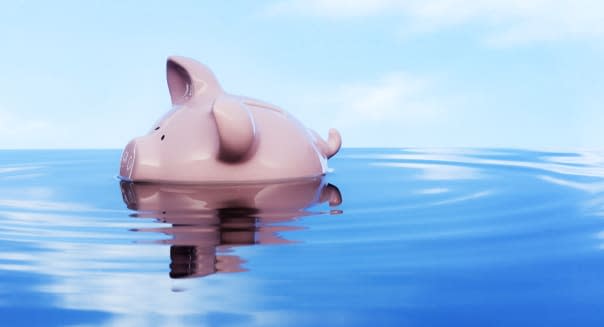8 Easy Steps We Used to Pay Down $60,000 in Debt - Fast

There are plenty of ways to wind up with debt. You can acquire it as the price of a good education. You can pile it on when bad stuff happens to your house. Or you can simply spend too much money at the mall. With almost $60,000 in consumer debt, I was guilty of all of these -- and more.
Worse than just having debt, I was in debt denial. I happily made my credit card and auto loan payments every month without thinking twice about them. In my mind, I was doing the right thing. I had no idea what kind of impact my debt was having over my financial life.
Then, in the fall of 2011 my wife and I found out that we were expecting, and realized immediately that our spending habits needed to change. We didn't want our children to be burdened by our financial mistakes. Together, we made a plan we hoped would eliminate our debt before the birth of our new baby.
We didn't quite make that deadline, but 12 months later, we were completely debt free. Here's the basis behind our strategy:
Step 1: List All Your Debts, Their Balances and Interest Rates
Go to the website of every financial institution to which you owe money. Copy down all the balances and their respective interest rates, exactly as they appear. It's also important to know what your minimum payments are for every account.
Step 2: Set Periodic Goals
Short-term goals allow us to break really hard things into manageable chunks that we can feel good about after we complete them.
When you set a goal to pay off your all debt, you first need to assess how much money you can contribute to debt repayment every month. Divide your total debt by your planned monthly repayment amount. This will give you roughly the number of months it will take to become debt free. This isn't accounting for interest, of course, so understand it'll likely take you longer than that to repay your debt, but it's a fair gauge of how much longer you have to bear this burden.
Step 3: Start Paying Off Your Balances from Highest APR to Lowest
Each month, make the minimum payment on every account, then dedicate all the rest of your debt repayment budget to the one that you're trying to eliminate first -- the one with the highest APR. Over time, this allows you to waste as little as possible on interest.
When you pay off one debt, that frees up money that you can now use to tackle the next debt down the list. This concept is known as " the snowball plan."
Step 4: Trade In Big Ticket Items
Do you still owe big money on your vehicle? You can significantly reduce your total debt by trading in your car for something cheaper. If you can get $18,000 for a trade-in, and find a $10,000 car on the lot, you just came into $8,000 to help you pay off debt.
You can apply the same idea to boats, yachts, jet-skis, snowmobiles, among other items. Now isn't the time to have pricey toys. You can have toys when you're debt-free.
Step 5: Sell Almost Everything
Now that all of your big ticket items have been either sold or traded in for less expensive versions, you can start becoming a professional Craigslister.
Carry around a notebook and write down every item that you use over the course of a given week. You'd be surprised with how little of your stuff you actually use. Why not try to turn some of your less-used items into cash?
Step 6: Work, Work, Work
This one is going to blow your mind: To pay off debt faster, you can work more. Overtime, second jobs, babysitting, etc. More money, more debt repayment.
Step 7: Reward Yourself for the Small Wins
Achieving a goal, no matter how small, should be celebrated. Naturally, this doesn't mean that you should go out and spend hundreds of a dollars at the mall for paying off $100 of your debt. Instead, splurge small -- perhaps on one of those fancy coffee drinks you've (wisely) been denying yourself.
Or, as a free alternative, you can guilt people into congratulating you by posting your achievements on Facebook.
Step 8: Use Windfall Money Wisely
My definition of windfall money is "any money that you receive that didn't directly come from your employment." Tax refunds, bonuses, inheritances, birthday money, wedding gifts, whatever. If you are in debt, windfall money isn't fair game for fun. You should apply it directly to your debt. You couldn't ask for a better gift than being closer to debt free, so don't blow it.
Congratulations, You're Debt Free
Now that you've made it, teach your friends and family how they can accomplish the same thing. You'll be living proof that it's actually possible.

